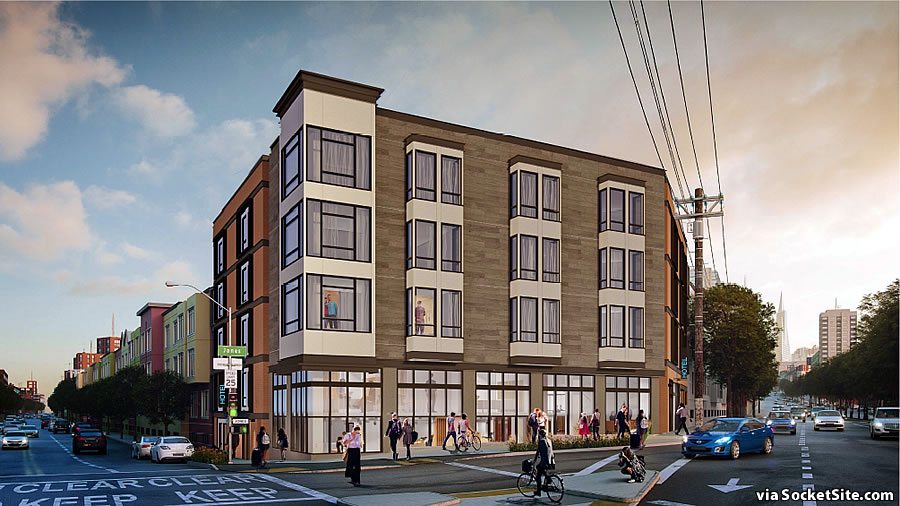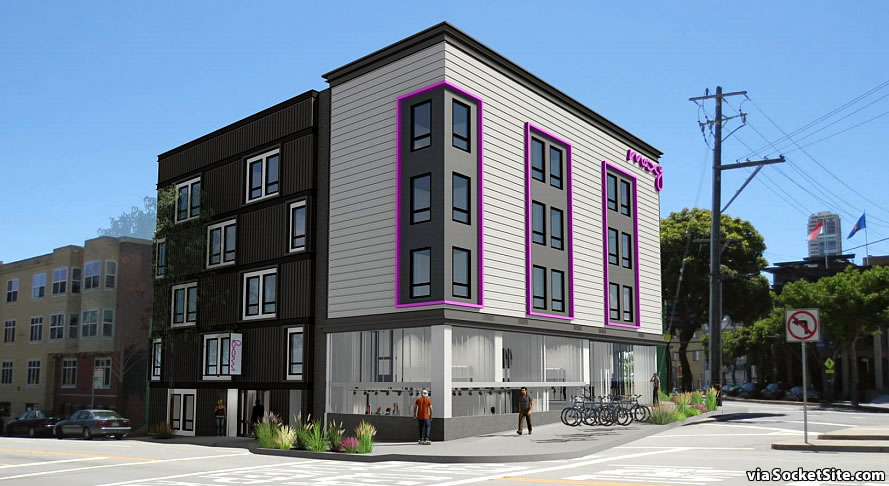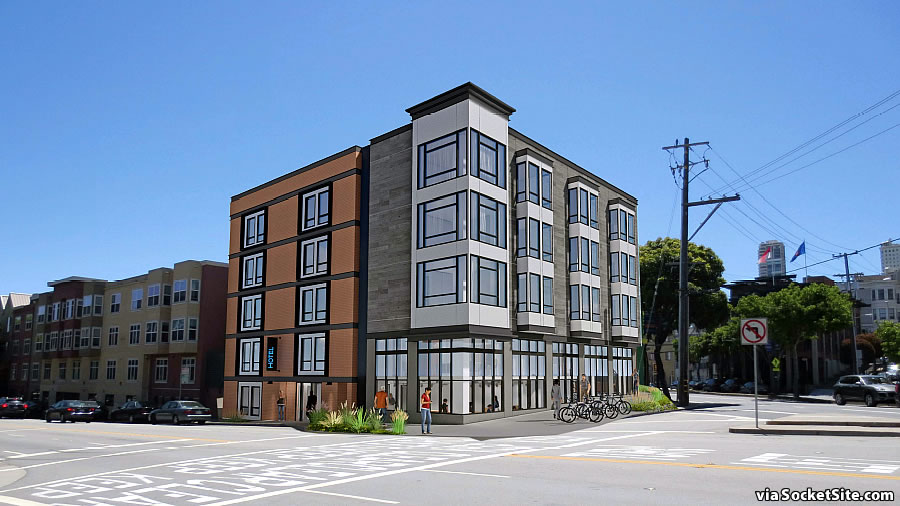Facing pushback from a number of Planning Commissioners who echoed the fears of neighbors that the proposed Moxy Hotel, a Marriott brand which targets the millennial traveler, “who understands that style can be delivered at attractive prices,” could attract “late-night activity that is incompatible with the adjacent residential development,” the sponsors of the project have terminated their contract with Moxy and redesigned the proposed hotel to rise at 1196 Columbus Avenue.
The hotel’s ground floor bar/lounge at the corner of Jones and Bay, which would have doubled as the reception area for the hotel, has been eliminated, replaced by a more traditional lobby check-in desk and seating area for patrons of the hotel.
The building’s façade was modified by Stanton Architecture “to be more compatible with the surrounding context,” with a masonry façade along Bay Street and bay windows along Columbus and Jones.
The hotel’s roof deck has been eliminated from the plans.
And the hotel has been re-flagged as an AC Hotels by Marriott, “a European-inspired design-focused hotel that caters to the business traveler,” which apparently “will not encourage potentially disruptive nightlife activities.”
And while opponents of the project have also argued that the development “breached the natural boundary” of hotels north of Bay Street, and that the privately-owned site should be used for affordable housing instead, arguments which caught the ear of a number of commissioners as well, San Francisco’s Planning Department is recommending that the plans for the revised hotel been approved next week.



Since when does San Francisco care about neighboring residential anything?
Right now the lobbying group for club owners otherwise known as the Entertainment Commission is pushing though basically a blank check for anyone anywhere in the city that wants to have open air music venues. That on top of already carte blanche noise permits regardless of the impact on residents. And since zoning in much of the city is a joke they shrug their shoulders and wave ‘zee permit’ right out of a page from Hannah Arendt.
If the planning commission cared about residents they would make noise the responsibility of the noise makers to eliminate through proper sound insulation at venues. Instead they say its the responsibility of the hundreds of affected residents nearby to individually cope. Its ridiculous, and a big reason why nobody trusts them with the legalized pot club roll-out either. A history of bad planning is hard to shake when its legacy lives on all around you.
i think part of living in a city is accepting there are some loud music venues. san francisco has relatively few compared to new york and chicago.
plus – i can’t think of a single new venue that actually disturbs residents. the venues that you hate are grandfathered in, and frankly, they were there before most of the residents. forcing them to install costly new sound insulation would be too burdensome, and the city would probably face lawsuits. not to mention — no amount of insulation will effectively reduce sound transmission in old concrete and masonry buildings with windows. they are echo chambers with holes. you’d need to rebuild, which is a outlandish proposition.
I don’t “hate venues.” I frequent them. What I hate are a bunch of arriviste bro’s who are here to make money and party — period — and could care less about our collective quality of life. They will move on to their next gig. All one needs to do is watch Entertainment Commission meeting videos (one of the few non-opaque aspects of that ongoing fraud of a commission still extant) and its nothing but sound complaints, and a sort of Frat mentality among the staff with lots of chuckling about how people’s nights were ruined by super loudness. Ha ha ha. And there are rarely consequences of any kind. As for sound reinforcement I think its absurd to propose that hundreds of homes surrounding one loud venue sport expensive, stuffy sound proofing when instead the city could exact a fee (lord knows we know how to do that) from residential development that would fund all sorts of adaptive work to make venues whisper quiet outside and ear-popping inside — European city style. But that would require leadership instead of SF’s trademark empty suits for sale.
there are some people that come to San Francisco because there are good job opportunities. They really don’t feel it is home or care for it all that much. That is a fact that you have to accept or you are going to drive yourself looney. Focus on your own life, being a better person, maybe get a new hobby, chill out, take a deep breath, and be grateful for all you have.
OMG. Can architecture get any more boring? I often ask myself why I try to continue to practice in this city.
Wow. A bunch of [people] were upset that their country home would be disturbed by hotel guests? Oh, it’s not a country home, but a city residence? My, my my.
The housing next door is senior and affordable (and quite ugly) and managed by Bridge Housing, which has a lot of political clout in SFGov. For instance they just got the huge Balboa Reservoir deal. They no doubt made some calls. That unfortunately is the only way the planning commission can be made to listen.
I know. How dare people living with mental and physical health challenges have any say? Especially since they can’t afford to live anywhere else. Much less at-risk teens and a day care center for families living in SRO hotels. They should just accept whatever gets proposed, no matter how if affects them.
What is happening to this “city?”
We wouldn’t want anyone enjoying a roofdeck!
Columbus and Bay is such a quiet nook of the city.
While I don’t condone the NIMBYism, the new exterior, however pedestrian, is much more attractive than the original one.
I actually prefer the second design as opposed to the original. The original looks like the inside of the new Yotel I stayed in Boston last month. Can’t say I would ever stay in another Yotel again unless it was in an airport and I had a long layover. For all the fears of partying millennials, affordable micro-room hotels attract retired folks looking for an inexpensive place to stay, budget-minded business travelers, and people like me who wanted to experience these trends first-hand. I didn’t see any drunken party types at least in Boston anyway.
The fact that there are multiple hotels, bars, a music venue and many, many tourist attractions and restaurants within spitting distance here negate, for me at least, any comments that this is a ‘residential neighborhood’. Also, if you watched/heard the commission hearing, people complained about potential construction noise, which would happen regardless of what was getting built.
Funny, the City doesn’t care about “late-night activity that is incompatible with the adjacent residential development” and “potentially disruptive nightlife activities” when it comes to running an Airbnb (aka The Amateur Gypsy Hotel) in a residential setting.
My experience is that upscale “millennial ” hotels like The Standard aren’t the problem. Instead watch out for budget hotels. Instead of regulating market categories like this, regulate the problem directly, as in “quiet hours after 10pm”.
100%
Blech…
When I read “late-night activity that is incompatible with the adjacent residential development”, I thought they were referring to prostitution.
The city is 100% ok with prostitution in residential areas.
But God forbid someone with a roofdeck!
The whole objection assumes that the hotel’s strategy of luring Millennials, let alone rowdy ones, would be successful… a dubious idea in the first place.
They are generalizing the millennials and saying that they only party while so called business ones are the quieter ones. Too much power given to neighbors in the city.
Why do I keep reading things about how millenials don’t date, never go to concerts, can’t afford to drink, and go to bed early?
UPDATE: Site of Rejected Hotel on the Market Touting Formula Retail Potential